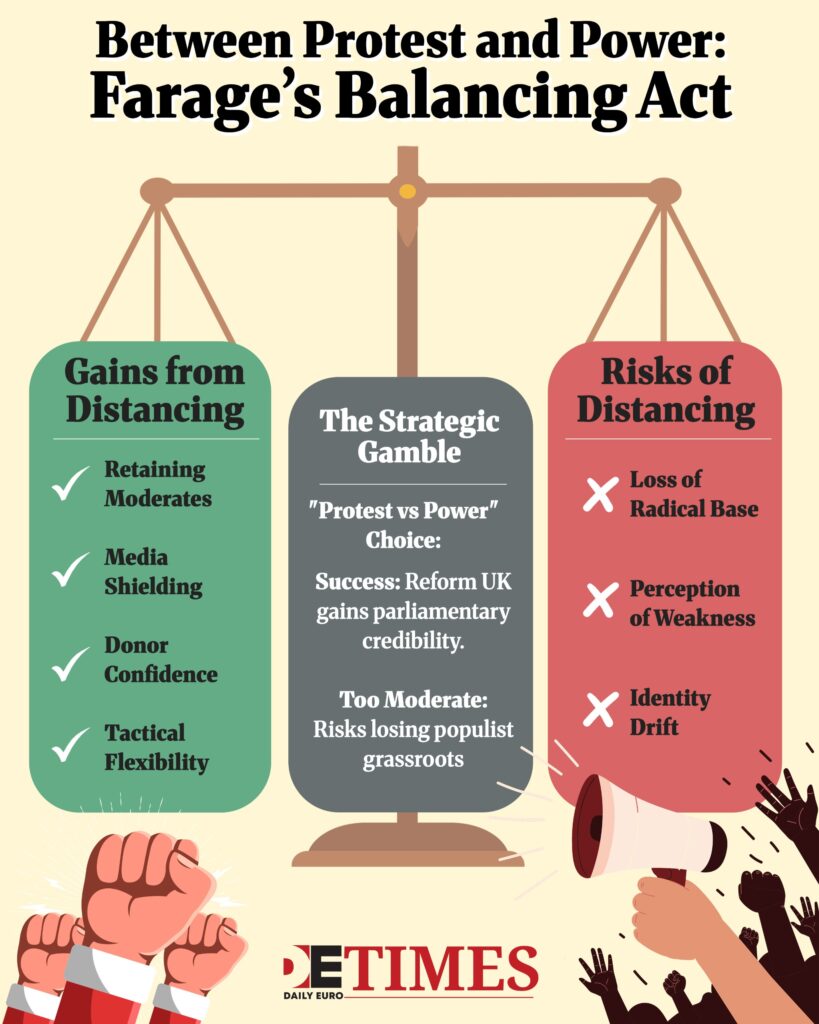On the British far right, the name Tommy Robinson (Stephen Yaxley-Lennon) has long been synonymous with radicalism, scandal, and extreme positions.
Yet talk of Reform UK’s rise in the polls has seen political manoeuvrings take hold; Nigel Farage, the leader of Reform UK, seems to be distancing himself from Robinson.
Is this a typical power move or something more about Robinson’s unorthodox views even for Farage’s standards?
Robinson as a “Radio Advertising Road” and a Trap of Extremes
Tommy Robinson is known for his activism in street protests, his vocal statements against Islam and immigration, and his legal troubles.
He is a figure who attracts attention, but often alienates the general public. Following the recent march on September 13, 2025 (the "Unite the Kingdom Rally") — which attracted tens of thousands of participants — Robinson's model protest has become a symbol of the rise of street nationalism, but also a cause for alarm: violence, clashes with police, and arrests.
For Farage, Robinson is doubly dangerous: first, as a symbol associated with extreme street activism, which could clash with images of civil discourse in British politics whilst also being a potential anchor for radicalism, in turn alienating moderate voters disillusioned with the Tories and even Labour.
Why Farage is Distancing Himself: Four Key Motives
- Electoral Pragmatism and the Reform UK Brand
Farage seeks to position Reform UK as a party capable of competing in parliamentary elections, not just as a platform for extreme views.
The association with Robinson acts as a marker of being “too extreme right,” which could cost him votes and legitimacy.
Analysts note that there is concern within the party that associations with Robinson will "contaminate" the brand and alienate those Farage wants to attract—moderates, those who want change, but not radicals.
- Legitimacy Risks and Legal Woes
Robinson has been repeatedly tried, convicted of contempt of court, and accused of ties to extremist circles.
As party leader, Farage does not want to be accused of shielding extremists or facilitating the normalization of radical ideas. When Robinson publicly runs afoul of the law, it gives opponents grounds to criticize Reform UK.
This became especially relevant when Elon Musk publicly supported the demand to "free Robinson." Farage responded by saying Robinson was "not what we need."
- Ideology vs. Tactics: Managing Radical Elements
While Farage shares concerns about immigration and border control, common themes with Robinson, he appears to favour a more moderate, less aggressive style, especially in public and on policymaking.
Such a style allows him to engage with broader segments of society, avoid reputational scandals, whilst retaining establishment-type donors who are reluctant to be associated with extremism.
- Funding and Strategic Alliances
Farage needs resources to build an effective political machine.
The support of a major donor or public backer can be compromised if the party associates with figures perceived as outside the acceptable spectrum. After Musk expressed support for Robinson, Farage criticised the move and emphasized that money or public support are irrelevant if they conflict with the party’s principles.

Risks of this Distancing
- Retaining the Moderate Electorate: Distancing helps retain voters who may sympathize with migration control issues but reject extreme language. This can be critical in elections, when every tenth or hundredth of a percentage point can decide the outcome.
- Loss of a Portion of the Radical Base: Activists and supporters who see Robinson as a symbol of “honesty” and a rejection of political correctness may feel betrayed. This could lead to criticism of Farage as “too soft” and “having betrayed his principles.”
- Impact on Media Image: The media easily misuse references to Robinson when criticizing the right-wing opposition, painting all its representatives as equally extreme. By distancing himself, Farage can reduce the number of such attacks.
- Tactical Flexibility: Without being indebted to extreme figures, Farage can maneuver: collaborate on specific initiatives with those who share some of his values, but avoid major public statements that could be perceived as justifying extremism.
Strategic Rationality or Self-Censorship?
Distance isn’t necessarily a renunciation of ideological positions, but rather a tactical choice.
Farage likely calculates that the scale of his ambitions, otherwise known as parliamentary success, requires a more nuanced and less shocking style of politics often associated with Robinson.
Yet this choice carries a risk: if Farage slips into excessive caution, he could lose the spark of discontent that attracted part of his base. The party risks becoming just another right-wing force without a clear “character” if it fails to maintain a balance between assertive rhetoric and acceptability.
Nigel Farage is distancing himself from Tommy Robinson not simply out of a desire to ‘disengage from radicals,’ but because he finds himself at a crossroads: does he wants to remain a figure of protest or become a established force for power in Number 10? Such distancing is an attempt to draw a line between what he can afford as a protester and what he needs as a politician seeking power.
This is a strategic decision, taking into account electoral success, legal risks, donor partners, and of course public perception.
Farage is relying on pragmatic rhetoric, cautious alliances, and a clear distinction: “I can talk about migration, but I will not accept extremism as part of my platform.” If he successfully maintains this balance, Reform UK will be able to gain greater legitimacy and with it electoral success.
If Farage allows radicals to infiltrate Reform UK, he risks following the footsteps of populist mistakes and failure by association or worse: defamation.
Read the Latest Articles on DET!
Suez on Rails: China is Changing the Map
Plucked Out of Thin Air? How Meteorologists Name Storms
I Need My Labubu: Wang Ning’s Billion Dollar Toy





